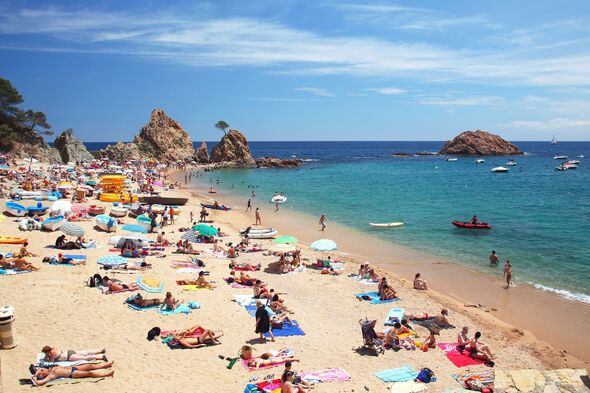World
Tourists Cautioned as Deadly Blue Dragons Close Beaches in Spain

British tourists visiting Spain are facing a significant health warning due to the emergence of a potentially lethal sea creature known as the blue dragon (Glaucus atlanticus). This unusual marine animal has prompted the closure of several beaches along the Spanish coast during the summer months.
The blue dragon, a type of sea slug, is notorious for feeding on toxic jellyfish and storing their venom, which can cause serious reactions in humans. A sting from this creature can trigger symptoms such as extreme pain, skin irritation, vomiting, and fever. Notably, sightings of blue dragons off the coast of Spain have been absent for over 300 years until they reappeared in 2021, typically inhabiting the warmer waters of the Atlantic, Pacific, and Indian Oceans.
Local authorities have responded swiftly to recent sightings. In Lanzarote, lifeguards evacuated La Cantería beach in Órzola after blue dragons were spotted in the waters. These creatures have also been reported at El Médano and Leocadio Machado beaches in Tenerife, leading to increased safety warnings from officials.
On July 5, 2023, swimming was prohibited along a seven-mile stretch of coast in the Guardamar del Segura area, located just north of Torrevieja on the Costa Blanca. The mayor of Guardamar del Segura, Jose Luis Saez, announced the ban on social media, stating, “Bathing is prohibited following the appearance on Vivers Beach of two specimens of Glaucus atlanticus, known as the Blue Dragon.”
Blue dragons typically measure around 3 cm (just over one inch) in length. They are characterized by their ability to float on the ocean surface by swallowing air bubbles. Although their vibrant appearance is striking, they pose a serious risk to unsuspecting swimmers.
For anyone who suffers a sting from a blue dragon, immediate first aid is crucial. Victims should rinse the affected area with seawater and carefully remove any tentacle fragments using a stick or gloves. Applying a cold pack can help reduce swelling. If symptoms such as breathing difficulties, dizziness, or severe allergic reactions occur, it is vital to seek medical attention promptly.
With the recent emergence of blue dragons in Spanish waters, tourists are urged to remain vigilant while enjoying the beautiful beaches. Awareness and caution can help prevent dangerous encounters with this stunning yet hazardous marine creature.
-

 Entertainment2 months ago
Entertainment2 months agoIconic 90s TV Show House Hits Market for £1.1 Million
-

 Lifestyle4 months ago
Lifestyle4 months agoMilk Bank Urges Mothers to Donate for Premature Babies’ Health
-

 Sports3 months ago
Sports3 months agoAlessia Russo Signs Long-Term Deal with Arsenal Ahead of WSL Season
-

 Lifestyle4 months ago
Lifestyle4 months agoShoppers Flock to Discounted Neck Pillow on Amazon for Travel Comfort
-

 Politics4 months ago
Politics4 months agoMuseums Body Critiques EHRC Proposals on Gender Facilities
-

 Business4 months ago
Business4 months agoTrump Visits Europe: Business, Politics, or Leisure?
-

 Lifestyle4 months ago
Lifestyle4 months agoJapanese Teen Sorato Shimizu Breaks U18 100m Record in 10 Seconds
-

 Politics4 months ago
Politics4 months agoCouple Shares Inspiring Love Story Defying Height Stereotypes
-

 World4 months ago
World4 months agoAnglian Water Raises Concerns Over Proposed AI Data Centre
-

 Sports4 months ago
Sports4 months agoBournemouth Dominates Everton with 3-0 Victory in Premier League Summer Series
-

 World4 months ago
World4 months agoWreckage of Missing Russian Passenger Plane Discovered in Flames
-

 Lifestyle4 months ago
Lifestyle4 months agoShoppers Rave About Roman’s £42 Midi Dress, Calling It ‘Elegant’









